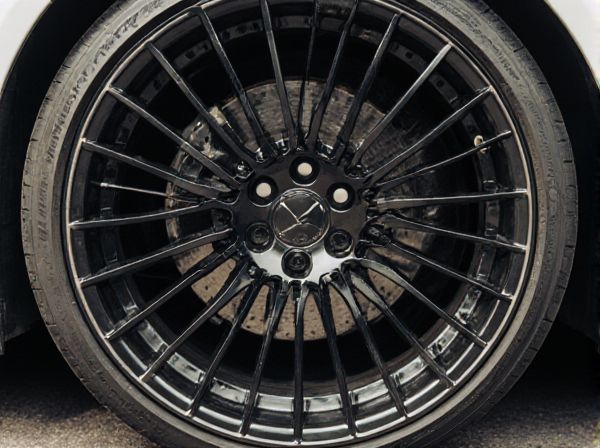
Photo illustration: Wire Spoke vs Alloy Spoke Wheel
Wire spoke wheels offer superior flexibility and shock absorption, making them ideal for off-road and vintage-style bikes, while alloy spoke wheels provide increased strength, durability, and lower maintenance, perfect for high-performance and modern bicycles. Your choice depends on the type of riding you prioritize; wire spokes excel in comfort and repairability, whereas alloy spokes shine in stiffness and longevity. Both wheel types impact ride quality, weight, and aesthetics, so understanding their benefits ensures you select the best fit for your cycling needs.
Table of Comparison
| Feature | Wire Spoke Wheel | Alloy Spoke Wheel |
|---|---|---|
| Material | Steel or stainless steel wires | Aluminum or magnesium alloy |
| Weight | Heavier, reduces fuel efficiency | Lighter, improves handling and fuel economy |
| Strength | Flexible, absorbs shocks well | Rigid, better for performance |
| Maintenance | Requires frequent tension checks and truing | Minimal maintenance, corrosion resistant |
| Durability | Prone to rust and wire breakage | Corrosion-resistant, longer lifespan |
| Cost | Generally lower upfront cost | Higher initial investment |
| Appearance | Classic, vintage look | Modern, sporty design |
| Common Usage | Classic cars, motorcycles, off-road bikes | Sports cars, performance vehicles |
Introduction to Motorcycle Wheel Types
Motorcycle wheels primarily come in two types: wire spoke wheels and alloy spoke wheels, each offering distinct performance and aesthetic benefits. Wire spoke wheels consist of multiple tensioned steel spokes connected to a hub and rim, providing flexibility and durability ideal for off-road terrain. Alloy spoke wheels, made from lightweight materials like aluminum, deliver enhanced rigidity and reduced weight, improving handling and fuel efficiency on paved roads.
What Are Wire Spoke Wheels?
Wire spoke wheels consist of a central hub connected to the rim by multiple tensioned metal spokes, typically made of stainless steel or galvanized steel, offering flexibility and shock absorption on rough terrains. Commonly found on motorcycles, bicycles, and vintage cars, wire spoke wheels provide superior durability against impacts compared to alloy spoke wheels. Their design allows for easier repair and replacement of individual spokes, making them ideal for off-road and heavy-duty applications where wheel strength and resilience are crucial.
What Are Alloy Spoke Wheels?
Alloy spoke wheels consist of spokes made from lightweight metal alloys such as aluminum or magnesium, offering enhanced strength and durability compared to traditional steel wire spokes. These wheels provide better resistance to corrosion and improved performance under high stress, making them popular for modern bicycles and motorcycles. Their design enables greater stiffness, contributing to more precise handling and reduced maintenance requirements.
Strength and Durability Comparison
Wire spoke wheels offer high flexibility and shock absorption, making them well-suited for rough terrain but potentially less durable under heavy loads compared to alloy spoke wheels. Alloy spoke wheels provide superior strength and rigidity due to their solid construction, enhancing durability and performance in high-stress environments. The choice depends on prioritizing lightweight shock absorption with wire spokes or maximum strength and longevity with alloy spokes.
Weight and Performance Differences
Wire spoke wheels typically weigh less than alloy spoke wheels due to their thin steel wires and lightweight rim materials, enhancing overall bike agility and acceleration. Alloy spoke wheels, made from aluminum or magnesium alloys, offer increased stiffness and durability, improving cornering stability and power transfer at the expense of added weight. The trade-off between wire and alloy spoke wheels centers on lightweight flexibility versus rigid performance, impacting both ride quality and handling precision.
Maintenance and Repair Considerations
Wire spoke wheels require regular tension adjustments and truing to maintain alignment, demanding more frequent maintenance compared to alloy spoke wheels. Alloy spokes offer enhanced durability with less frequent maintenance needs but can be more challenging to repair if damaged due to their solid construction. Repairing wire spoke wheels often involves replacing individual spokes, making fixes more cost-effective, whereas alloy spoke repairs typically require specialized tools or complete wheel replacement.
Off-Road vs. On-Road Suitability
Wire spoke wheels offer superior flexibility and shock absorption, making them ideal for off-road conditions with rough terrains and frequent impacts. Alloy spoke wheels provide enhanced rigidity and reduced weight, which improves handling and performance on smooth, paved roads. Choosing between wire spoke and alloy spoke wheels depends on prioritizing durability and impact resistance for off-road use or lightweight precision for on-road riding.
Cost Analysis: Wire Spoke vs. Alloy Spoke
Wire spoke wheels generally offer a lower initial cost compared to alloy spoke wheels due to simpler manufacturing processes and use of less expensive materials. Alloy spoke wheels involve higher production expenses, including casting or machining alloys, leading to greater upfront investment but often provide improved durability and performance benefits. Maintenance costs may be higher for wire spokes because they require regular tension adjustments, while alloy spokes typically need less frequent upkeep.
Aesthetics and Customization Options
Wire spoke wheels offer a classic, vintage aesthetic that enhances the retro charm of motorcycles and bicycles, appealing to enthusiasts seeking a traditional look. Alloy spoke wheels provide a modern, sleek appearance with intricate designs and finishes, allowing for greater customization through color options and unique patterns. Customization options for wire spoke wheels often involve different spoke counts and nipple finishes, while alloy spoke wheels support advanced shaping and anodizing techniques, expanding aesthetic possibilities.
Choosing the Right Wheel for Your Motorcycle
Choosing the right motorcycle wheel depends on factors such as durability, weight, and maintenance. Wire spoke wheels offer superior flexibility and shock absorption, making them ideal for off-road and rough terrain riding, while alloy spoke wheels provide greater stiffness and reduced weight, enhancing performance and handling on paved roads. Consider your riding style and terrain to determine whether the classic resilience of wire spokes or the modern efficiency of alloy spokes best suits your motorcycle needs.
 caratoz.com
caratoz.com